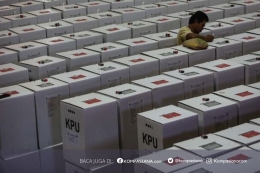To conclude my argument, Politics is not always the realm of human rationality. We humans are inherently an irrational animal. This is a fact most people tends to dismissed. We like to think that our acts, our decisions, are guided by sound rational thinking but we tends to forget that we are also part guided by our pathos. There are times when we suddenly aren't thinking straight and just immediately act based upon the animal instincts in all of us. We can see this in history repeated over and over again.
The "rational" Jacobin revolutionaries whom proclaimed that they value human life, only to guillotined so many heads in the French Revolution. Or in 1914 when everyone thought the assassination in the Balkan was just a little thing that won't erupt into a major war, only to find that small event snowballing into major event because every states start mobilizing because of their fear of each others.
Politics has always been guided by human emotions. As students of politics, it is our job to acknowledge this inherent human nature. Many of Clausewitz readers tends to read his book solely for its military strategy value but personally I think his book, On Waris more than just that. I think if I have to rank it, I valued Clausewitz's On War more than Sun Tzu's book because Clausewitz dive deeper into the human mind. To finish this argument, I'd like to add my own thinking into the whole argument: War is an expression of the will of the people.
References
Anderson, B. (2006). Imagined Communities. New York: Verso.
Beyerchen, A. (Winter 1992-1993). Clausewitz, Nonlinearity, and the Unpredictability of War. International Security, 17(3), 59-90. Retrieved from https://www.jstor.org/stable/2539130
Cederman, L.-E., Warren, T. C., & Sornette, D. (2011). Testing Clausewitz: Nationalism, Mass Mobilization, and the Severity of War. International Organization, 65(4), 605-638. Retrieved from https://www.jstor.org/stable/23016228
Clausewitz, C. v. (1989). On War. (M. Howard, & P. Paret, Eds.) Princeton, New Jersey, United States: Princeton University Press. Retrieved November 2021
Knapp, A. (2006). The Government and Politics of France (5th ed.). New York: Routledge. Retrieved November 2021
Scharf, M. (n.d.). "War! We felt a cleansing, liberation, and a tremendous hope.". Retrieved from First World War and the End of the Habsburg Monarchy: https://ww1.habsburger.net/en/chapters/war-we-felt-cleansing-liberation-and-tremendous-hope
Smith, A. D. (1991). National Identity. London, England: Penguin Group.







